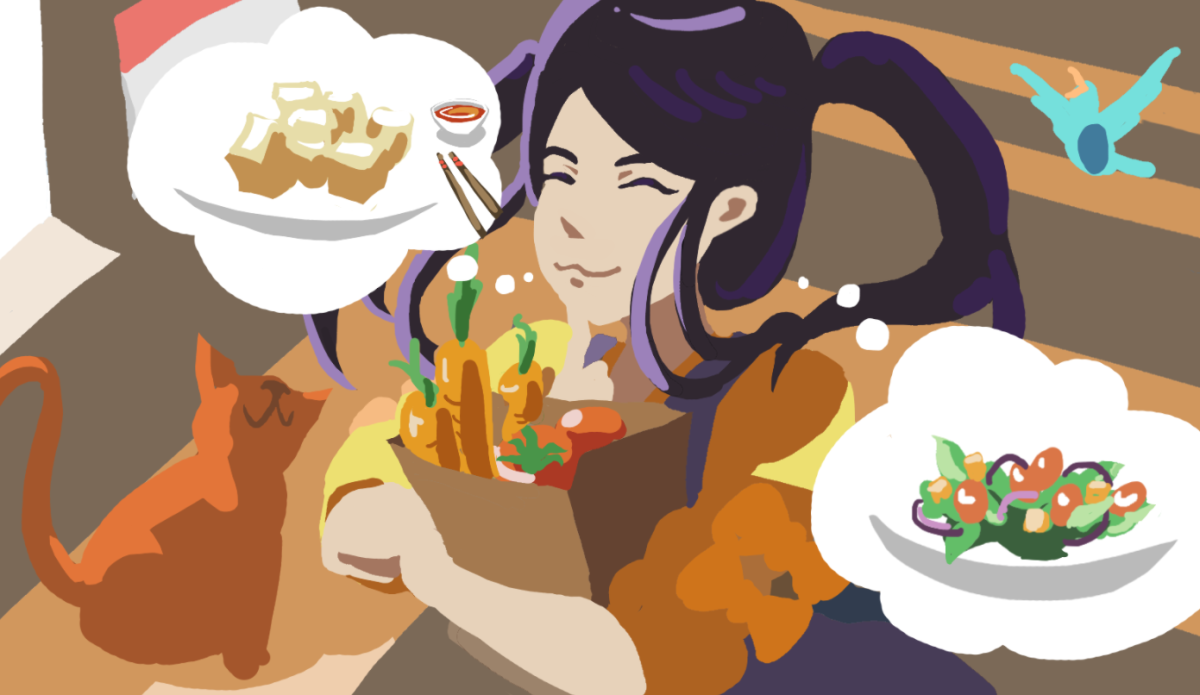Three reasons a plant-based diet should be the moral baseline for modern society

Illustration by Frankie Ho.
One question I always hear from people when I tell them I don’t eat animals or their by-products is whether I’m doing it for the environment, my health, or for ethical reasons. While all these reasons and more justify the discontinuation of animal exploitation, the simplest and most compelling is the moral argument.
The moral argument that I will describe has no specific origin, but has been built up over many years of thinking and has been influenced by many philosophers and academics in moral philosophy, such as Ed Winters, Sam Harris, Steven Pinker, and William MacAskill. The moral argument against animal exploitation for human consumption and recreation relies on three premises that follow each other chronologically; each premise relies on the preceding premise to establish moral consistency.
Premise one: Animals deserve moral consideration
We as humans can observe that animals are in fact conscious, which means they have an experience of the world. We can easily tell animals of the same species apart by their different personalities and we can see that animals have a preference to live and not be harmed or killed. We can understand that cutting the throat of an animal and cutting the stalk of a broccoli are two very different actions with different moral consequences. In fact, the meta-cognitive abilities of humans give us moral autonomy and a unique perspective in the animal kingdom. We can make moral judgments that other animals can not and choose between killing a conscious animal or pulling a carrot out of the ground.
Premise two: We should aim to reduce animal suffering and death
If we believe that animals deserve moral consideration, we should aim to reduce animal suffering and death wherever pragmatically possible. This follows the same moral logic that we should not do things simply because we can or because they feel good. For example, someone shouldn’t harm their dog simply because they are angry or annoyed. In fact, if we discovered that an individual enjoys harming their dog, we would and should remove that dog from the dangerous environment. Moreover, we would consider that person morally reprehensible and they might even be charged with a crime.
The thinking that creates this foundational moral logic can be followed through with any other animal. We are all conscious and we all have an experience of the world. In fact, if we put the brains of different mammals, including humans, next to each other we all share the exact same brain structures with variations in size and folding. We even share 60 per cent of our genetic makeup with chickens and our brains evolved from a shared ancestor. Although consciousness is an extremely elusive concept and science has yet to uncover all its mysteries, most experts agree that consciousness emerges from the brain. Therefore, with the understanding that our brains are either nearly identical to some animals or very similar and evolved from the brains of shared ancestors of other animals, it’s scientifically reasonable to attribute conscious experience to them and thus, aim to reduce their suffering.
Premise three: A plant-based diet reduces animal suffering and death
A plant-based diet reduces a large amount of animal suffering and death and has no negative consequences for our modern existence. In the aim of reducing animal death and suffering, this would be the most morally consistent way of eating. Humans are heterotrophic mammals and we must obtain our energy from external sources. This means that any form of consumption will come at some cost to other organisms, but we have a moral responsibility to reduce that cost as much as practically possible. Given that a plant-based diet causes the least amount of suffering to animals, such a diet should be the moral baseline for modern societies.
The strangest part about all of this is that few people would claim that they morally prefer an animal to die over a potato to be pulled out of the ground. People generally agree with the moral reasoning against animal exploitation. Most people form close connections with animals, would never hurt one willingly, and would always choose to save a life over taking one. In contrast, we needlessly kill millions of innocent animals every day. How is it that we can show so much compassion, care, and kindness to an animal in one moment and in the next have them served up dead on our plates? This perplexing phenomenon is what I’ve come to call our “moral blind spot.”







